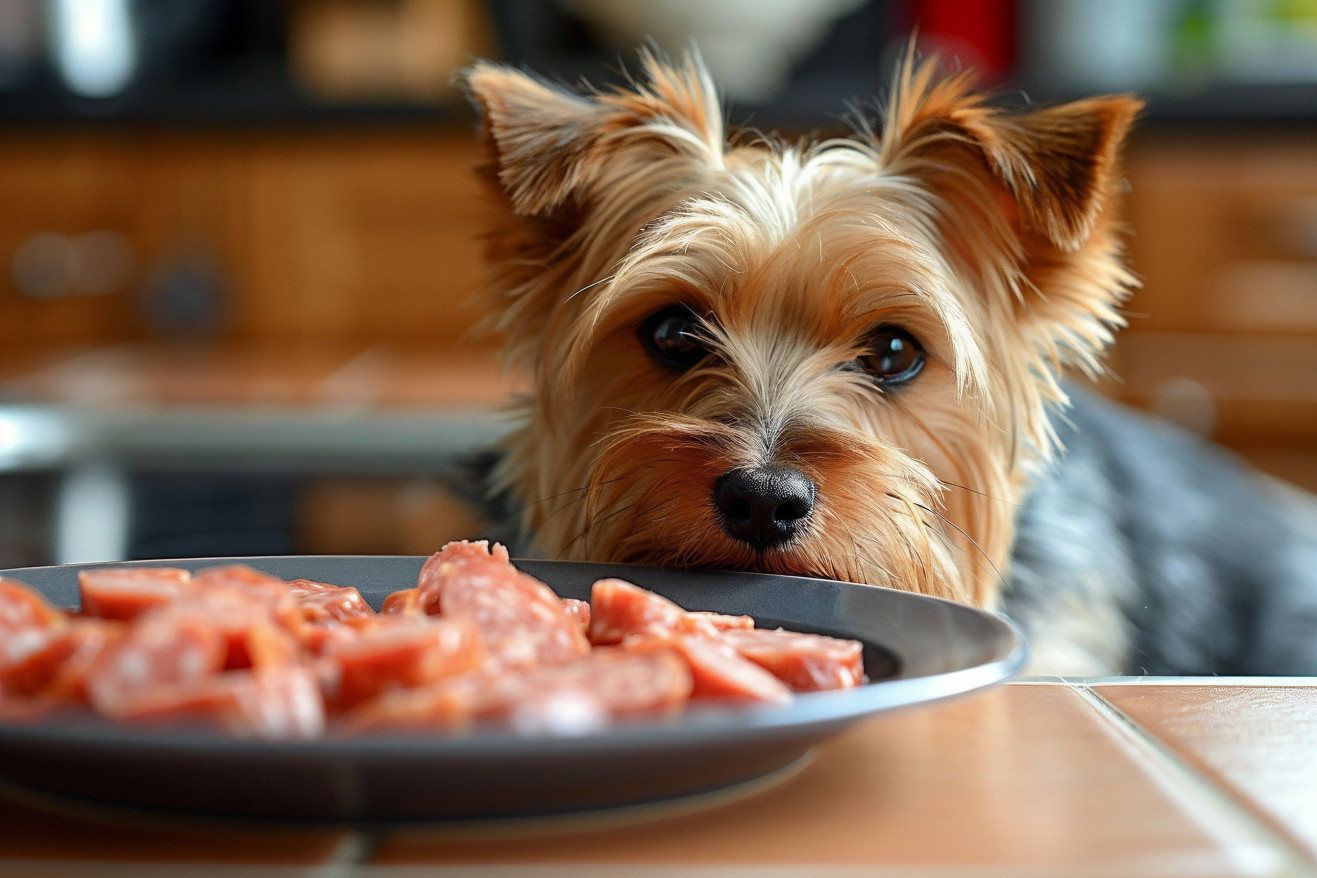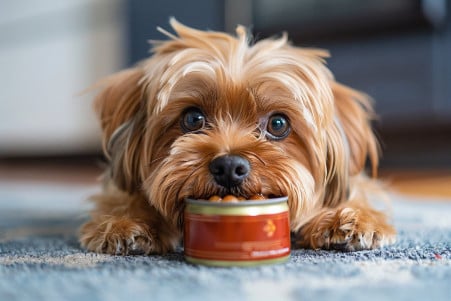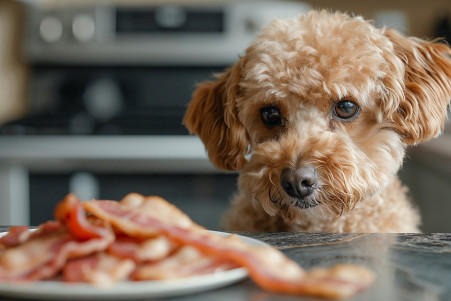Can Dogs Eat Bologna? Understanding the Risks of Processed Meats for Pets
13 February 2024 • Updated 12 February 2024

If you’ve ever been making a sandwich and had your dog look up at you with those big, sad eyes, you may have wondered if it was safe to give them a piece of bologna. While dogs can eat bologna, it’s not recommended. Bologna is a type of processed meat that’s high in fat and sodium, and it can lead to health issues like obesity and pancreatitis.
Plus, because it often contains harmful additives, it’s best to avoid giving your dog bologna whenever possible.
This article will use information from veterinarians and nutritional experts to help you better understand the risks of feeding bologna to your dog. This will include an examination of processed meats, the nutritional requirements of dogs, and the potential impact of the ingredients in bologna on dogs.
By looking at this range of studies, we hope to give you the information you need to make the best choices for your dog’s health and diet.
Can dogs eat bologna?
Nutritional Needs for a Healthy Dog and the Best Treats
According to VCA Animal Hospitals, dogs need a well-balanced diet that includes proteins, fats, carbohydrates, vitamins, minerals, and water to stay healthy. These nutrients help the body perform a variety of tasks, including repairing muscles and tissues, providing energy, and supporting the immune system. A well-balanced diet is the key to preventing disease and promoting a longer life for your dog.
When it comes to treats, it’s important to make sure they help contribute to your dog’s overall nutritional balance. Healthy dog treats need to be nutritious, delicious, and low in unhealthy fats and empty calories. As PetMD points out, treats should meet a dog’s basic nutritional requirements and supplement their regular diet, not work against it.
Bologna isn’t toxic, but it doesn’t meet the requirements of an ideal treat. Its nutritional content is high in processed fats and sodium, which don’t meet the AAFCO’s recommendations for a dog’s nutritional needs. By choosing treats that mirror the nutritional content of a well-balanced diet for dogs, you can help your dog’s diet instead of hurting it.
Health Concerns Associated With Processed Meats in Dog Diets
In addition to the high salt content in processed meats, like bologna, and the methods used to preserve them, there are other reasons why pet owners should not consider them the best dietary options for their dogs.
In the study published in Scientific Reports, researchers found that dogs were less likely to develop gastrointestinal diseases in adulthood if they were fed a diet that included a high proportion of non-processed meats and low levels of highly processed kibble when they were puppies.
On the other hand, the researchers also found that diets that included a high proportion of processed meats were associated with an increased risk of chronic enteropathy, a condition that causes symptoms like diarrhea and vomiting.
In addition, the Journal of Animal Science explains that the processing method used to make pet food can have a big impact on its nutritional value. In fact, the researchers found that raw meat-based diets (RMBDs) may be healthier for dogs than conventional commercial diets, possibly because they contain fewer processed ingredients and lower levels of advanced glycation end products (AGEs), which are known to contribute to chronic diseases.
Meanwhile, the Journal of the American Veterinary Medical Association says that veterinarians generally advise against feeding dogs raw or undercooked meats because of the potential for pathogen contamination.
However, the researchers also point out that there are nutritional imbalances and safety concerns associated with commercial processed diets. Given the ingredients in bologna and their impact on the safety of a dog’s diet, the benefits of whole, minimally processed foods are clear and should not be overlooked when it comes to a dog’s overall well-being.
How Bologna Ingredients Impact Canine Health
Bologna is often made with preservatives like nitrates and other additives that can be dangerous for dogs. Nitrates, which are used to preserve and color processed meats, have been shown to have negative impacts on animal health.
A study by Bruning-Fann published in PubMed found that nitrates can lead to changes in thyroid function and vitamin metabolism. The same study also found that acute nitrate toxicity can lead to a number of clinical signs, including methemoglobinemia, which is a condition that reduces the blood’s ability to carry oxygen.
A study by Marjorie L. Chandler published in PubMed found that while dietary sodium, which is found in high levels in bologna, may not cause hypertension in dogs directly, the study recommends that high salt intake should be avoided in hypertensive animals and that excessive sodium can be harmful to dogs with cardiac and renal issues.
The Merck Veterinary Manual warns that nitrate poisoning can occur in animals due to the high levels of nitrates in processed meats. Symptoms of nitrate poisoning include weakness, tachycardia, and even death due to oxygen transport inhibition. These studies show the dangers of feeding dogs bologna, which contains ingredients that are harmful to their health, instead of a diet that meets the nutritional needs of dogs.
Healthy and Safe Alternatives for Your Dog
While bologna isn’t necessarily a dangerous treat, the high fat, sodium, and preservative content make it less than ideal. Hepper recommends looking for better alternatives, like homemade meatballs or sausages that are made specifically for dogs and don’t contain any seasonings, that can be both tasty and nutritionally sound. These homemade options will provide the protein and fat that dogs need without the health risks that come with processed meats like bologna.
Remember to introduce new treats slowly so that your dog’s digestive system can get used to them. Try feeding your dog small amounts of these healthier treats at first and see how they do. Also, make sure to watch out for any potential allergens, especially if your dog has a history of allergies.
Make sure to talk to your vet before you make any big changes to your dog’s diet. They can help you come up with a plan that meets your dog’s specific nutritional and health needs. By choosing these healthier, meat-based alternatives, you can make sure that you’re looking out for your dog’s best interests and that they can enjoy their treats without the negative side effects of processed meats.
Final Thoughts on Dogs and Bologna
This article has covered everything you need to know about feeding your dog bologna. While dogs love the taste of bologna, its high fat, sodium, and preservative content, including nitrates, make it a poor choice for a dog treat. Both Top Dog Tips and DogTime have pointed out the health risks of processed meats like bologna, which can lead to obesity, pancreatitis, and cancer.
In summary, we do not recommend feeding your dog bologna regularly. A healthy diet that provides the nutrients your dog needs to thrive, and treats that support that diet instead of detracting from it, are essential to good pet nutrition. As we’ve covered, there are healthier meat-based options that can satisfy your dog’s taste buds without the negative health effects.
Use this article to help you make choices that will help your beloved dog live a long and healthy life. And remember, the best treat for your dog is one that’s healthy, safe, and given with love.


